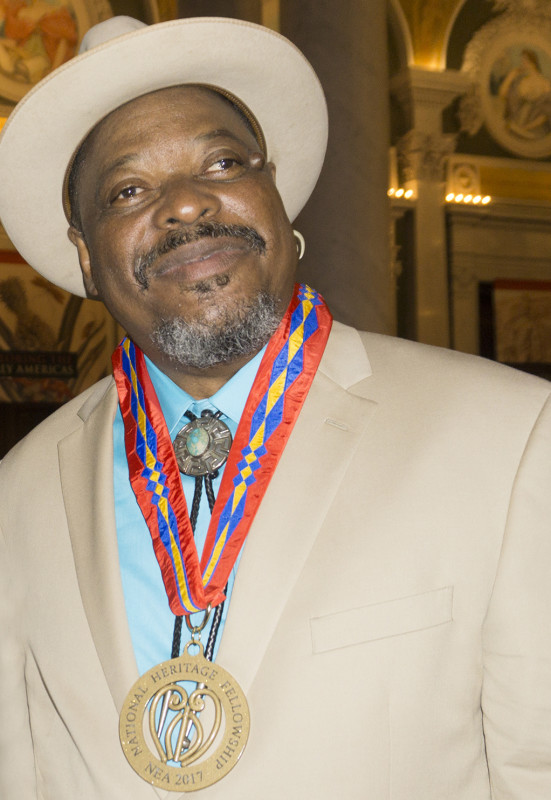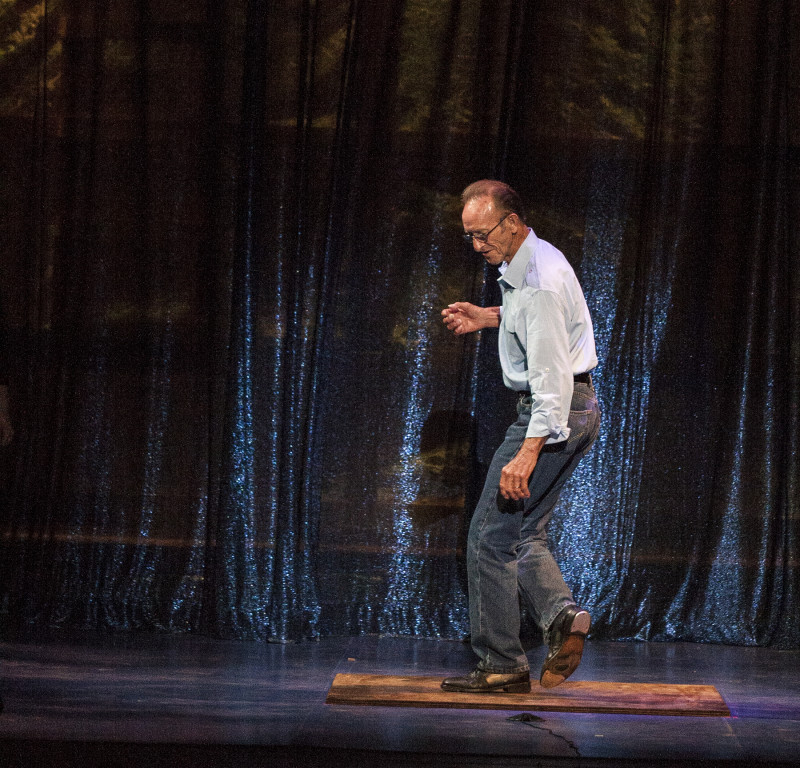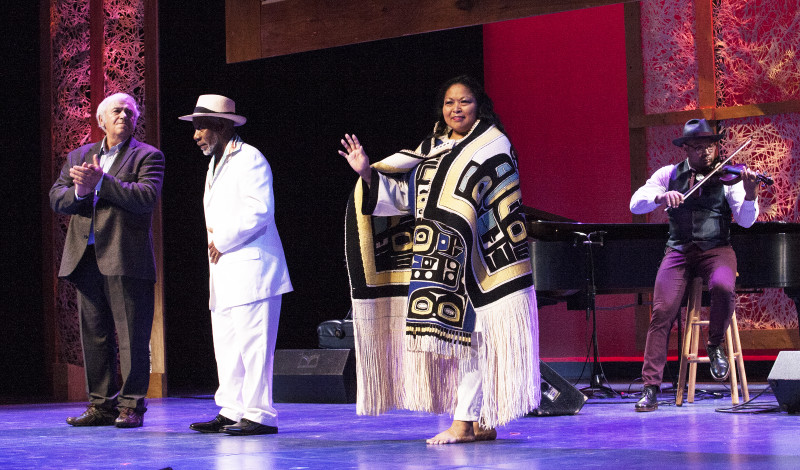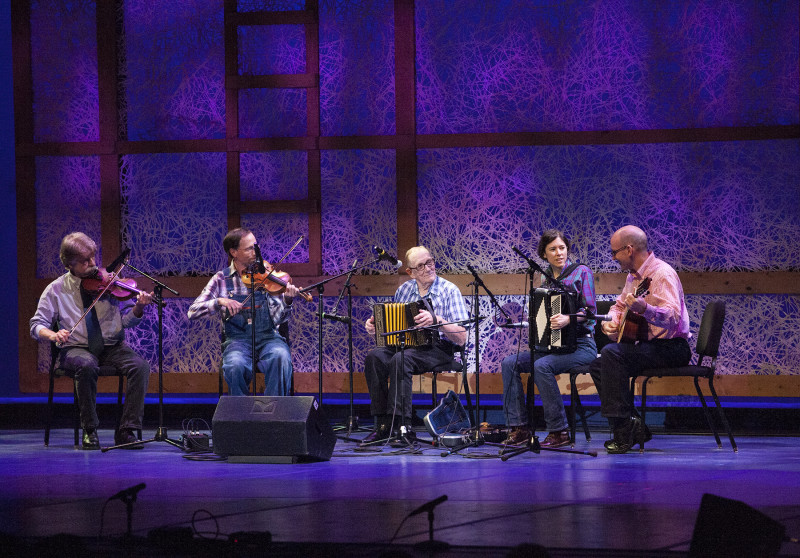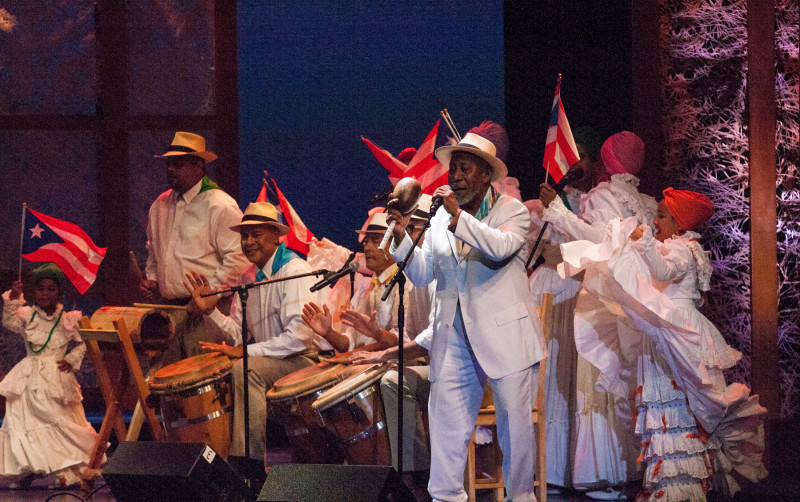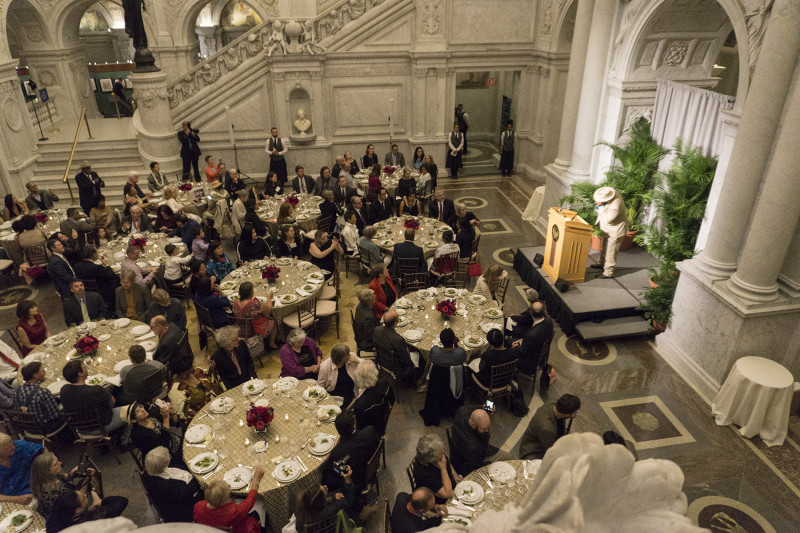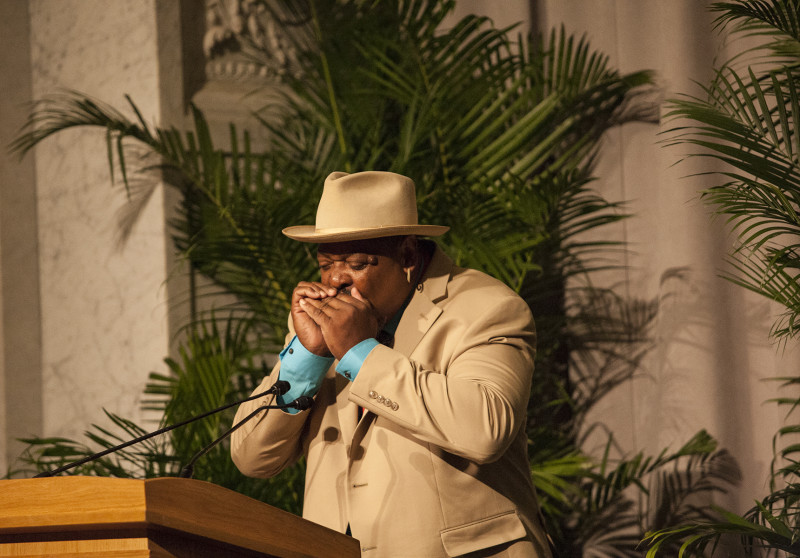By Frank Matheis with photographs by Bibiana Huang Matheis © 2017
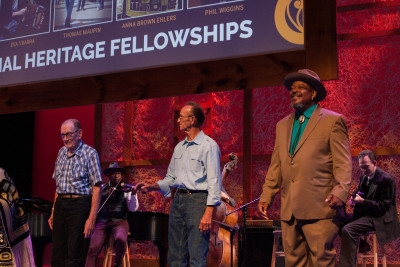
On September 14 and 15, 2017, the National Endowment of the Arts (NEA) sponsored a series of amazing events in Washington, D.C. that could make you proud to be an American – the National Heritage Fellowship Awards. It was the United States of America at its best, honoring its own traditional artists, dignifying them as “Master of Traditional Arts.” The coveted fellowship is the highest honor the United States bestows on the traditional arts. Often referred to by its unofficial designation as “Living Cultural Treasure” award, the fellowship honors and preserves the diverse cultural heritage in the United States. The NEA annually awards one-time-only National Heritage Fellowships to master folk and traditional artists, to recognize lifetime achievement, artistic excellence and contributions to our nation’s traditional arts heritage.
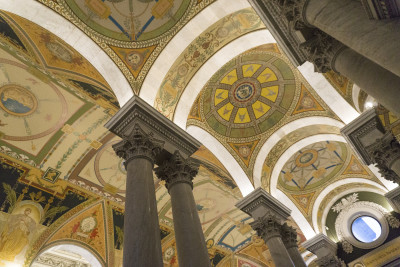
A Validation of the True Blues
Players and fans of the traditional, acoustic African American blues, worldwide, rejoice in the award bestowed on Phil Wiggins, a country bluesman. This 2017 fellowship also validates the music that came out of the harsh experience of the poorest, most oppressed, rural African Americans, the descendants of slaves. The acoustic country blues, the rural music that grew out of field hollers and prison work songs, churches and barrel houses in the heyday of the brutal deprivations of Jim Crow segregation, was a form of catharsis. The roots blues is simultaneously a lament and a celebration, dance music and an expression of hardship and joy through folk song. It is a powerful statement that the acoustic blues, which has influenced musical movements worldwide, is recognized in this award. Few people can express the emotive, musical sentiments of the rural blues with more prowess than 2017 fellow Phil Wiggins, a versatile traditional harmonica player in the Piedmont blues tradition, a gentle and melodic blues style of the mid-Atlantic region. He plays the diatonic ten-hole Hohner Marine Band harmonica in the country blues style, cupping both hands around the instrument and playing acoustically. His sound is not shaped by the gear, the microphone or amplifier when performing on stage. Instead, by his complex syncopated patterns, breath-control and rhythm, stylistic virtuosity and fiery solo runs. He is the only living harmonica player holding this honor. The only other harmonica players to hold this coveted fellowship were Sonny Terry and Elder Roma Wilson.
An Amazing Award Ceremony
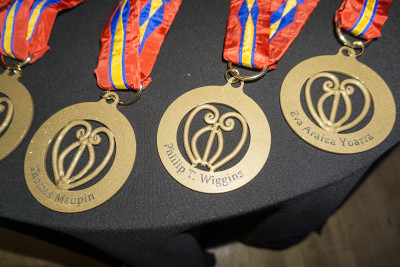 A spirit of harmony and cooperation prevailed throughout the ceremony and concert, in large part because the civil servants who ran the show were not just efficient but it was clear that they loved their jobs and they were very good at it, unlike those who want to slash their budget or eliminate them altogether. It was a sight to see and one that we will hopefully see time and time again. The impressive NEA team who worked hard to organize this entire process for a year and more, from candidate nominations to selection of winners and then the final award ceremony, deserve accolades. These government employees are intelligent, hardworking and committed and clearly vested in their respective functions.
A spirit of harmony and cooperation prevailed throughout the ceremony and concert, in large part because the civil servants who ran the show were not just efficient but it was clear that they loved their jobs and they were very good at it, unlike those who want to slash their budget or eliminate them altogether. It was a sight to see and one that we will hopefully see time and time again. The impressive NEA team who worked hard to organize this entire process for a year and more, from candidate nominations to selection of winners and then the final award ceremony, deserve accolades. These government employees are intelligent, hardworking and committed and clearly vested in their respective functions.
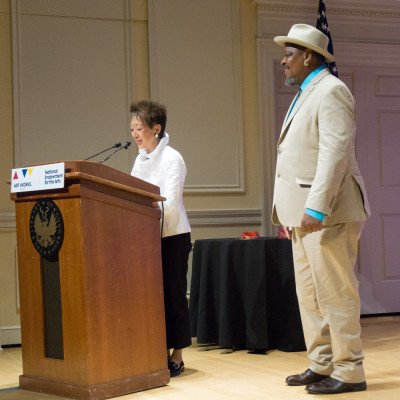
The Chairman of the National Endowment of the Arts, Jane Chu, aptly introduced Phil Wiggins:“Our next NEA Heritage Fellow is Phil Wiggins. Phil is from Takoma Park, Maryland, and he is a virtuoso on the acoustic harmonica. He was born in Washington, D.C., and he is a long-time fixture in the Piedmont blues community. He learned and he performed alongside blues and gospel artists like Flora Molton, Archie Edwards, Wilbur Big Chief Ellis, as well as National Heritage Fellows John Jackson, Warner Williams, John Cephas. Phil has a passionate dedication to teaching and mentoring and advocating. He has taught blues in schools, served on nonprofit arts boards. He has been a cultural diplomat who has performed on multiple continents on behalf of the U.S. State Department. And for his extraordinary mastery of the blues harmonica and contributions to American music, the National Endowment for the Arts honors Phil Wiggins. (Applause.)
Dr. Clifford R. Murphy, the Director of Folk & Traditional Arts at the NEA, spoke passionately about the importance of traditional arts in the American experience, and when he had to go off-script to hold the audience entertained while everyone was waiting for the arrival of a special guest, he displayed uncanny wit, a sharp sense of humor and clever charm. In his written remarks he thanked the award recipients for their “tireless commitment to excellence and understanding” a statement that in this case is applicable also to the NEA presenters, organizers, and behind-the-scenes staff. Kudos as well as to the National Council of Traditional Arts, Julia Olin, Director and Madeleine Remez, Associate Director and their entire team for helping to plan and organize the event.
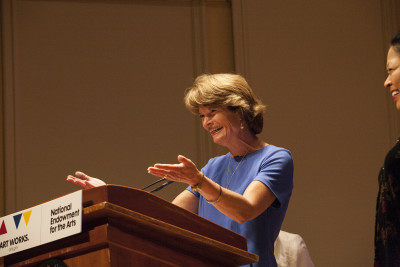
The special guest was the courageous Republican Senator Lisa Murkowski of Alaska, who was the only representative in Washington, D.C. to show up to pay tribute to her own constituent. She personally presented the National Heritage Fellowship medal to the Native American Chilkat weaver Anna Brown Ehlers, whose masterful blankets continue the ancient art form of weaving by the Native people of Southeast Alaska. The presence of Senator Murkowski demonstrated just one example of why she is one of the most respected and admired politicians in the country today. She is not only a powerful, independent representative of the people of Alaska, but a role model to young women everywhere for her fearless moral strength and willingness to resist powers temporarily greater than her, but not more virtuous. Her gesture of support here showed how much she cares and everyone was infatuated with her.
The 2017 NEA National Heritage Fellowship Recipients are:
Anna Brown Ehlers (Juneau, AK) – Chilkat Weaver
Eva Ybarra (San Antonio, TX) – Conjunto Accordionist and Bandleader
Phil Wiggins (Takoma Park, MD) – Acoustic Blues Harmonica Player
Thomas Maupin (Murfreesboro, TN) – Old-time Buckdancer
Dwight Lamb (Onawa, IA) – Danish Button Accordionist and Missouri-Style Fiddler – Recipient of the 2017 Bess Lomax Hawes NEA National Heritage Fellowship in recognition of an individual who has made a significant contribution to the preservation and awareness of cultural heritage.
Modesto Cepeda (San Juan, PR) – Bomba and Plena Musician
Norik Astvatsaturov (Wahpeton, ND) – Armenian Repoussé Metal Artist
Ella Jenkins (Chicago, IL) – Children’s Folk Singer and Musician ( absent)
Cyril Pahinui (Waipahu, HI) – Hawaiian Slack Key Guitarist (absent)

Phil Wiggins – Traditional Blues Harmonica Player and Teacher
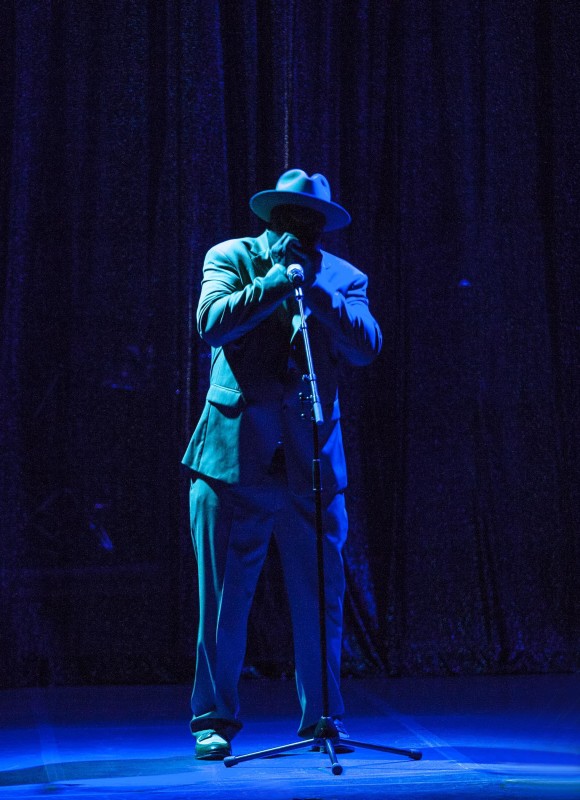
As a teenager living in Washington D.C. in the 1970s, he played at the Smithsonian National Folklife Festival with street singer Flora Molton, sitting in with blues greats Johnny Shines, Sunnyland Slim, Sam Chatmon, Robert Belfour and Howard Armstrong. By the time he graduated from high school in 1973, D.C. blues elders John Jackson, John Cephas and Archie Edwards had embraced him. He joined the Barrelhouse Rockers, a band fronted by pianist and singer Wilbert “Big Chief” Ellis, where John Cephas played guitar. They toured regionally until Ellis retired in 1977, when John Cephas invited him to join in the duo ‘Cephas & Wiggins’.
With John Cephas as guitarist and primary singer, the duo performed together for 32 years as internationally renowned stars of the country blues, and a staple on blues radio, ever present on the concert and festival circuit – all with the help of National Council for Traditional Arts director Joe Wilson. Cephas & Wiggins played Carnegie Hall, Royal Prince Albert Hall in London and the Sydney Opera House, as well as small venues worldwide, touring every continent except Antarctica. They recorded more than a dozen critically acclaimed albums, including on Flying Fish and Alligator Records, winning the prestigious W.C. Handy Blues Award in 1984 for Best Traditional Album of the Year and in 1987 as Entertainers of the Year. They even performed at the White House with B.B. King. Phil Wiggins as well as Cephas & Wiggins have been featured in major music magazines, including on the cover of Living Blues, and the Washington Post, the New York Times, the Chicago Tribune and many more. University of Maryland professor, author, blues historian and producer Dr. Barry Lee Pearson has released numerous Cephas & Wiggins tracks on his Smithsonian Folkways album collections, in addition to his frequent writings over more than 30 years, which also featured the duo and John Cephas’ autobiography.
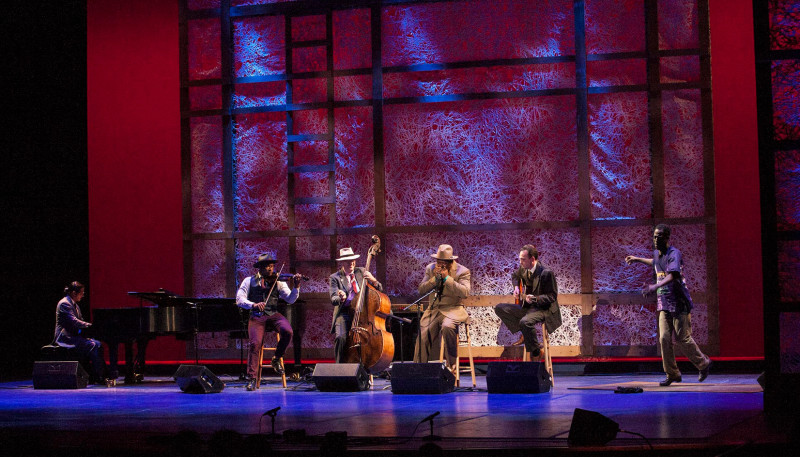
Since the 2009 death of John Cephas, Phil has performed with numerous musicians including Nat Reese, Corey Harris, Australian guitarist Dom Turner, Ben Hunter and Joe Seamons, Sherman Holmes, George Kilby, Jr., the Rev. John Wilkins, Jerron Paxton, and longtime friends Eleanor Ellis and Rick Franklin. He fronts the acoustic swing/roots/blues ensemble, the Chesapeake Sheiks, and is actively engaged in reuniting the Piedmont blues with its origins of African American buck, Juba and tap dancing.
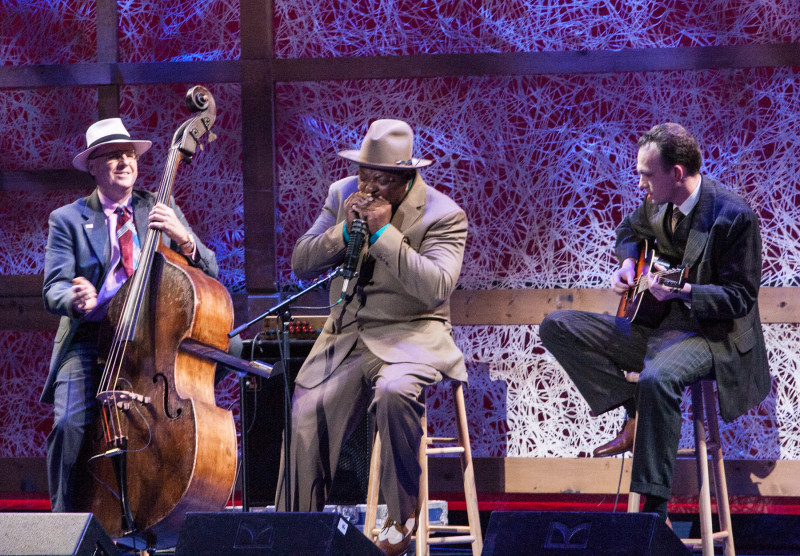
Phil Wiggins has taught thousands of burgeoning harmonica players and actively continues to teach and lead as artistic director in workshops, such as at the Augusta Heritage Center of Davis & Elkins College in West Virginia and the Port Townsend Acoustic Blues Workshop in Washington State. Plus, he continues to play an active role on the board of the National Council for Traditional Arts.
In the Company of Greats
The NEA National Heritage Fellowship has been bestowed on some of the greatest luminaries in traditional and folk music. In the traditional blues genre, past winners include some of the most important figures in blues history: B.B. King, John Lee Hooker, Pinetop Perkins, Sunnyland Slim, John Dee Holeman, Elizabeth Cotten, Clifton Chenier, Robert Lockwood Jr., Honeyboy Edwards, Brownie McGhee, Jack Owens, Mavis Staples and her father Pops Staples, and many more. Other giants of traditional music include country/bluegrass/Appalachian players Doc Watson, Bill Monroe, Ralph Stanley, Del McCoury, Hazel Dickens and Earl Scruggs. Past winners cover all types of traditional music: Hawaiian slack key guitar player Ray Kane and lap steel slide player Sol Hoopie; Tex-Mex accordion player Flaco Jimenez; Cajun accordion players Dewey Balfa, Marc Savoy and fiddler Michael Doucet; Dobro® players Jerry Douglas and Mike Auldridge; and Irish fiddler Kevin Burke – just to highlight a few.
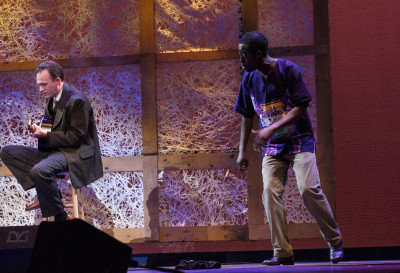
A Tip of the Hat to Regional Traditional Piedmont Blues
Phil Wiggins now joins the ranks of his eminent elders, friends and compatriots in the Washington, D.C area traditional Piedmont blues scene to win this distinguished award. His former duo partner, the Piedmont blues singer and guitarist John Cephas, received the National Heritage Fellowship Award in 1989. Phil’s friend and early career catalyst , the great blues singer/guitarist and songster John Jackson received the honor in 1986. The blues singer/guitarist and songster Warner Williams, who took the award in 2011, is now the only other living practitioner of the regional traditional blues besides Phil Wiggins with this recognition.
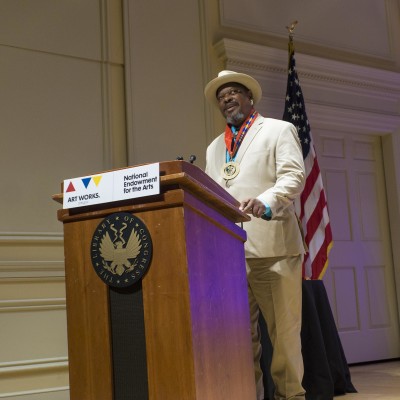
A Philosophical Message by Phil Wiggins
Along with the NEA honor, Phil Wiggins received a congratulatory certificate from his Maryland congressman, as well as a letter from the President of the United States of America on official White House stationery. President Trump, who had previously threatened to abolish the NEA, or at least to defund it drastically, stated: “The United States is home to a diverse array of artists, musicians, performers and craftsmen who represent the very best in their fields. Through innovative techniques, extraordinary talent, and masterful precision, they enrich our country…”
Suspiciously fine words, especially from a man who gained a wide reputation for his fearless and forceful way of expressing his feelings about timely topics on tweets, if inelegantly. Surely, he is right about these words here. Yet, in these times, how does an artist reconcile the political and social reality with the integrity of his/her own art and political perspectives? How does someone like Phil Wiggins, a proud African American artist who keenly understands the socioeconomic and political issues confronting all Americans today, accept a major cultural award from this government in these perilous times without giving up one’s own principles? Phil Wiggins knows the reality of judicial inequality, mass incarceration, poverty, rural plight, violence, immigration, drug addiction and racism. It could be easy to simply say that “we are a government by the people for the people” and that “he” is not “it”, or to pontificate and get up on a sanctimonious soapbox as you see in TV award shows. The plainspoken but poignant response was typical Phil Wiggins. Here is how Phil Wiggins, more intelligent than most, but ordinarily never loquacious, handled it in his acceptance speech:
“PHIL WIGGINS: That’s an advantage to being local. (Laughter. Responding to the loud applause) I have to say I’m pretty amazed to be standing here this evening. Woo, I never imagined when I was a kid and with my toy harmonicas trying to figure out how to make music on them, huffing and puffing on those toy harmonicas, that those three inches of metal and wood would take me to every continent except Antarctica. So that’s pretty amazing. When you’ve been as far away from home as I have been in my playing life, you think a lot about home. And, when I think about home, my first as association with that word I guess is from hearing my mother talk about home. Whenever she talked about home she was talking about Titusville, Alabama. And I could tell she was thinking about home or that she was talking to my grandmother, because her Alabama brogue would come back really strong.
And I remember when I left home to go to college- I went to live with my aunt and uncle in New Jersey – and my mother gave me this patch quilt to take with me. My aunt and uncle, they didn’t have an extra bedroom for me to sleep in, so I slept on the floor for two years under this patch quilt that my mother gave me that my grandmother had made. And I remember my mother looking at that patch quilt and saying, “Well, that’s Aunt Precious – that’s the dress she wore to prom. And that’s the suit that Brother Wilson wore at graduation.” And I thought that patch quilt is an amazing symbol of this country that we call home. It’s a strange time to be thinking about that, and to be feeling about that, and I am so happy to be a part of this celebration, because it celebrates what that patch quilt symbolizes. It symbolizes this patch quilt of beautiful deep cultures from all over the world that came to make up this country that we call home. And it’s not that home that these folks that are going around waving confederate flags that they want back; it’s the home that’s represented by all these wonderful artists and crafts people that make the country that I am glad to call home. Thank you.”
Just as he concluded that acceptance speech, the first to jump to his feet to enthusiastically extend his hand to Phil was Thomas Maupin, the old-time white buck dancer from Murfreesboro, Tennessee. He and Phil had already formed a friendship backstage. Phil reported that Maupin’s grandson, who had joined the buck dancer on banjo during the concert, had given Phil “one of the greatest compliments ever”, by saying “You could play a dance all by yourself.”
That spirit of solidarity and brotherhood just about says it all and that’s what it was all about.
